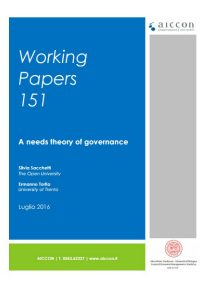151 – A needs theory of governance
Abstract
New-institutional economics hypothesizes imperfect rationality, self-seeking preferences, monetary-related needs, and opportunism as fundamental features of human behavior. Consistently, new-institutionalist models of governance highlight the efficiency and transaction costs minimizing features of control rights and governance. Differently, needs theory of governance, as here presented, hypothesizes imperfect rationality, multiple needs, and reciprocity, in which case opportunism is reduced to an exception to individual behavior.
Consistently, it presents a theory that links production governance with the wellbeing of those partaking in production. Building on Maslow’s human psychology, the governance model suggested in this paper is aimed at evidencing the self-actualization potential of control rights, organizational structures and practices.
The application of Maslow’s theory to the institutional structure of organizations suggests that the deepest organizational layers (control rights and governance) broadly correspond to the most basic needs in Maslow’s theory (survival, security and belonging), while the outer layers (managerial models and employment relations) correspond to the fulfillment of the highest needs (self-esteem and self-actualization).
Cooperative firms are used as an illustration of governance solutions consistent with needs theory in human psychology.
Key words: new-institutional economics; opportunism; governance; needs theory; human psychology; self-fulfillment; cooperative firms; inclusive governance.

